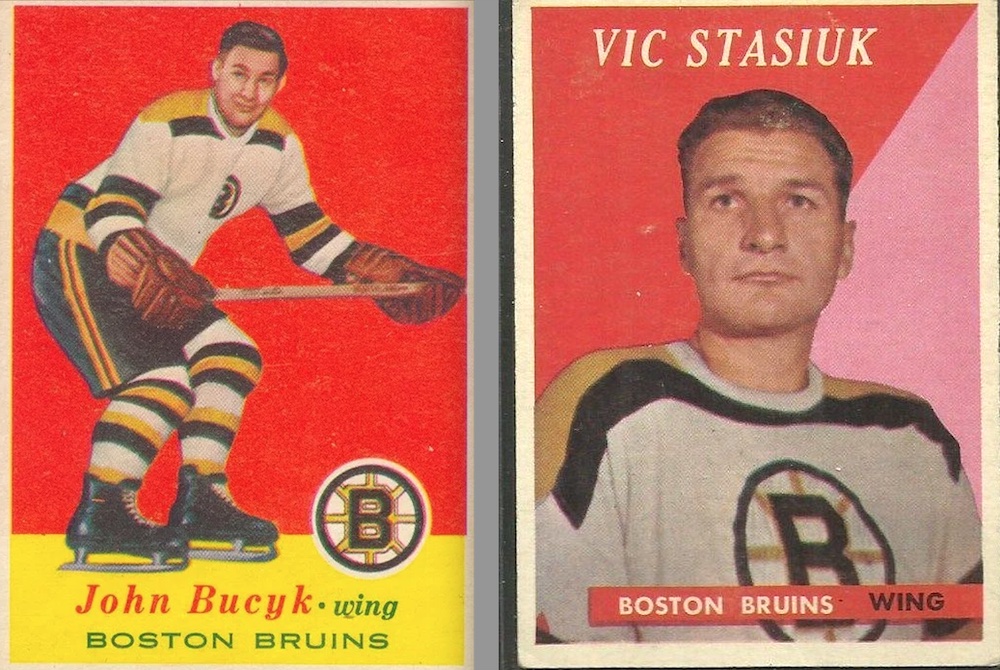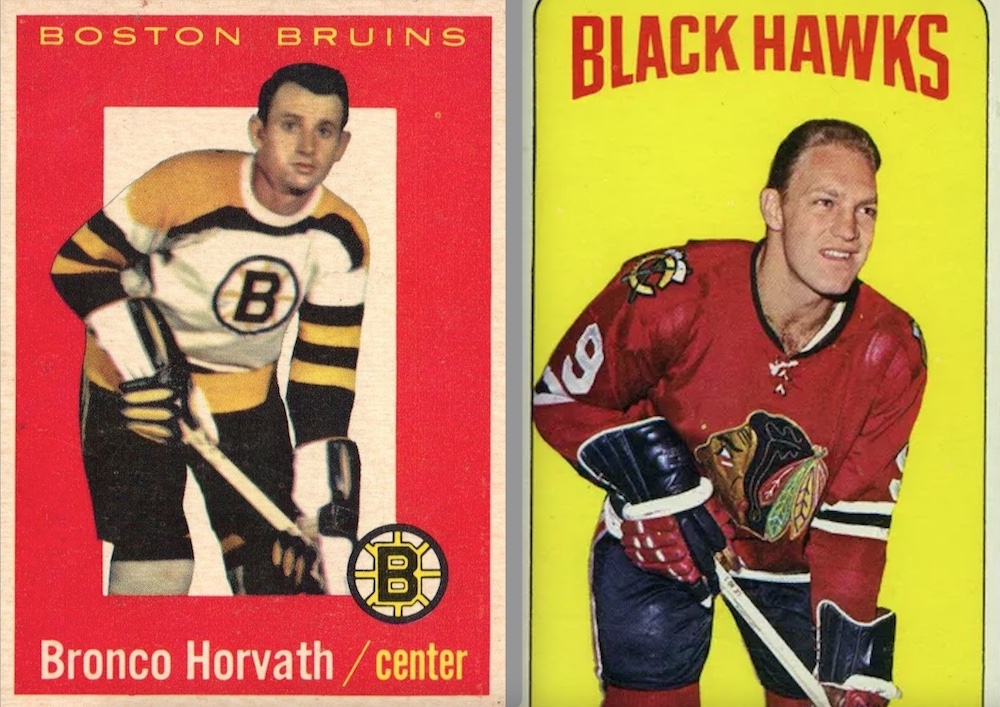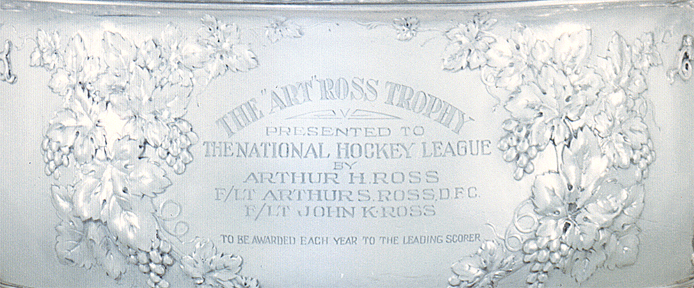A few days ago, I got an email from my friend Tosh suggesting that perhaps a story about the Uke Line might be of interest these days. I haven’t taken a lot of requests on this web site. As I indicated in my most recent post, I don’t usually give a lot of thought to what story comes next. Something usually just pops up.
In his email, Tosh included a link to an online post from The Ukrainian Weekly that gives a pretty good history of the Uke Line. (You can read it here if you’d like.) But he wondered if I had something from my own “unique perspective” to add to the story.
Well, I did know of one thing. And sort of stumbled on to some other things too. So, here we go…
Having all played together in the minors with the Edmonton Flyers of the Western Hockey League in 1954-55, the Uke Line was formed for the 1957-58 NHL season after the Boston Bruins acquired center Bronco Horvath and left winger Johnny Bucyk in a couple of separate transactions. At training camp, the two newcomers were teamed with right winger Vic Stasiuk (who had been with the Bruins since 1955). They were a big success and by the midway point of the NHL season, the Boston trio trailed only the Montreal line of Maurice Richard, Henri Richard, and Dickie Moore as the top-scoring unit in the NHL.

On January 6, 1958, Herb Ralby of The Boston Globe wrote that back in training camp, Bruins coach (and former star) Milt Schmidt had “remarked that the new Uke Line reminded him of his Kraut Line,” Boston’s high-scoring trio of the late 1930s and 1940s. Schmidt was impressed by the way Horvath, Stasiuk, and Bucyk “were forever huddling to talk over mistakes and possible plays.”
“When Bobby (Bauer), Woody (Dumart), and I were playing on the Kraut Line,” Schmidt said, “we always huddled after rushes in practice to talk things over. We also were inseparable. We lived together, ate together, and went out together as well as playing together. The Ukes do the same thing. That’s what makes a good line.”
In The Boston Globe of January 18, 1958, Ralby wrote that Horvath, Stasiuk, and Bucyk had rented the home of former Bruins defensemen Pat Egan and were living together there. All three apparently enjoyed cooking, and they ate a “varied menu,” although it was always steaks on game day.
“We usually buy $7 worth of steaks,” explained Bucyk. “They’re really good size. Vic broils them while Bronco is the salad man. He’s good at it too.”
The Uke Line had a strong season in 1957-58, slumped a bit in 1958-59, and enjoyed their best year together in 1959-60. In fact, Bronco Horvath found himself in a tight race for the NHL scoring title with Bobby Hull that year. It went right down to the final game of the season, which pit Hull’s Chicago Black Hawks (two words in those days) against Horvath’s Bruins.

Horvath had 39 goals and 41 assists for 80 points heading into he finale at the Boston Garden on March 20, 1960. Hull had 38 goals and 41 assists for 79 points. The Golden Jet equalled Bronco with his 39th goal early in the second period, and picked up his 42nd assist and 81st point when he set up Eric Nesterenko with just 6:59 left in the game. Horvath was kept off the scoresheet all night, and when the game ended in a 5-5 tie (no overtime in those days), Hull had won the scoring title by a single point.
Some time after the season ended, Bruins radio play-by-play man Fred Cusick interviewed longtime former Bruins coach and executive Art Ross on a sports program Cusick hosted from the Clubhouse restaurant in Boston’s Kenmore Hotel. Ross, of course, is the namesake of the trophy given to the NHL scoring leader, which he and his sons, Arthur and John Ross, donated to the league after the 1947–48 season.

In earlier years, Bruins stars Cooney Weiland (1928-29), Milt Schmidt (1939-40) and Bill Cowley (1940-41) had all led the NHL in scoring. Ross told Cusick that when he had the honour of presenting his new trophy to Elmer Lach of the Canadiens at the Montreal Forum in 1948, “I said then I hoped I’d live long enough to see one of the Bruins players win it.
“This was my big year,” said Ross, “so I was really disappointed.”
Later, Phil Esposito (five times) and Bobby Orr (twice) combined to win the Art Ross Trophy for seven straight seasons from 1968-69 through 1974-75, but Ross had passed away in 1964 so he never got to see a Bruin win his trophy.
Bronco Horvath was the closest Ross got.
But was Bronco Horvath actually Ukrainian?

Before I started writing this, I was pretty sure I remembered reading somewhere that one member of the Uke Line didn’t actually have Ukrainian heritage. Wikipedia notes that Horvath was born to an ethnic Hungarian family that emigrated from Transcarpathia after the end of World War I, when it became part of Czechoslovakia. It does appear as though that region has also been part of Ukraine over the years … but I don’t know enough about the history to say that for certain.
However, Elmer Ferguson wrote in the Montreal Star on January 9, 1958, that he had received a letter from a proud Hungarian Canadian taking him to task “for referring to the Uke Line as a trio of Ukrainian boys,” on a recent Hockey Night in Canada Broadcast.
“We believe that you, Mr. Ferguson, owe Bronco Horvath an apology…” wrote George Horwath of Leron, Saskatchewan. “I have the acquaintance of several fine Canadian Ukrainians. None have intimated that they wish to be known as Hungarians, and for the same reason we Hungarians wish to keep our racial identity in tact…. [A] public retraction of your error will, I am sure, suffice the rest of us Canadian Hungarians.”
Elmer Ferguson wrote that, “Our humble apologies go forward at once, and in these, we hope, the Bruins publicity department headed by the esteemed Herb Ralby, will join us.”
Still, Bronco Horvath was inducted into the Ukrainian Sports Hall of Fame in 2019 (Bucyk was inducted in 2017; Stasiuk in 2018).
So – as I often say – “Who is knowing?”
[NOTE: It turns out that Fred Addis, president of the Society for International Hockey Research, and a native of Port Colborne, like Bronco Horvath, is knowing! Have a look at the post at the bottom of the comments below.]
As always an interesting read.
Bronco Horvath being inducted into the https://ukrainiansportsmuseum.org/ is probably much like Ross Brooks being named as Rhode Island’s Jewish Athlete of the Year one year. Causes people to draw inferences that aren’t exactly right.
Perhaps that’s it… But, there are a lot of areas in that part of the world that have seen the borders changing around them through the years.
Very interesting. Although I wasn’t into hockey as a young girl, I was lucky to have as a friend a lovely girl, Sinona, who was Ukrainian. She was also beautiful, with blonde hair, blue eyes, and a face that I can still picture. She was dancer, and on points at a very young age. She also had point shoes with taps. Her toe tapping was sensational. We were friends from about grade 5-8 until her family moved to Sask. to be with several generation of the family. My other experience with Ukrainians was our neighbours. There were three girls, one older than I was, one my age, and a baby. The mama would bake her own fabulous bread every day. The thing that scared me is that when she cut slices, she would put the bread in the arm pit, and cut the bread upwards towards her rather full bosom. I was petrified, but the bread was amazing. My heart is heavy for these people in spite of the fact that many were quick to comply with the Nazi decrees to make the country free of Jews. And that antisemitism went back for many years. My late father-in-law came from the Belarus area in about 1895. He arranged to get to Winnipeg where he rented a horse and wagon, and filled it with farming equipment and household needs. He was to go across Man. into Sask, and the horse dealer told him that with a name like Resnick, he would probably be lynched. So he changed the name to Rossnick. He met many in the three provinces that could have made his life come to end if they knew he was Jewish. He spoke Polish, Russian and peasant lingo of Ukraine, and of course, Yiddish. Because he had light hair and blue eyes, he was accepted as a Ukrainian, and there he made enough to return to Toronto and start a business selling old and new equipment, luggage, etc. He dropped the “nick” and became “Scottish”! This business evolved into Ross Tool Company, which Harold, my late husband, took over in 1950 retiring on New Year’s Eve, 1989. Hope you enjoy my little history and the relationship with Ukraine. (Hate to say that some of the worst attacks on Jews was in the country, but now they have a Jewish leader, and one of the largest Jewish communities in Europe. They all deserve peace!!)
Wonderful stories, Judith.
I love this Judith. What a life your father-in-law led!
Good to read something that doesn’t focus on the present war!
Thanks.
Another breezy bit of Eric history although this touched a sensitive nerve. I worked for the Rangers in publicity during the 1954-55 season and then covered the Blueshirts for the Hockey News and NY Journal-American. Bronco Horvath never should have wound up in Boston with the Bruins. He was terrific as a Ranger but then coach — not my best friend — Phil Watson mishandled Bronco. I remember one point where one of the reporters asked Horvath why he didn’t score more goals. “I could but not from where I’m sitting — at the end of the bench.” Phil’s treatment of Horvath was one of the big issues I had with the coach. Good for the Bruins; bad for NY.
Another fine read, EZ. Perhaps a tad too much Bruins for this Habs fan, though. :^)
For this Bruins fan of Ukrainian heritage – I can’t get enough (grin). Thx!
Horvath’s problem is common – my great-grandfather emigrated to Canada (Beausejour, Manitoba) in 1893 from Galicia (look it up). He was born in a town east of Lviv. Galicia was divided between Poland and the Russian Empire in 1920. We’ve always identified as Ukrainian mainly because who in Canada has heard of Galicia? And where he was born is now in the Ukraine.
Same would go for anyone whose relatives were born in Manitoba before 1905 (when it wasn’t part of Canada) or Newfoundland & Labrador before 1949. I don’t think anyone would say they weren’t Canadian. Geopolitics, eh? Jeff
Part of my mother’s family actually came from Galicia!
(Not sure if their part is now in Poland or Ukraine.)
At first reading it seemed that Art Ross donated the trophy and also donated his two sons. I have often been tempted. Now, at ages similar to yours, they are prepared to donate ME to whomever will take me!
Excellent story.
Of course Hungarians are not a “race” despite what that long ago letter writer wrote. They just think they are. We all are of one “race” or species. The human race. Some, like Vlad the Child killer, have let their membership card expire, but most of us are still what my grandson, as a little boy, referred to as “cousins”
Back in the day there were “lines” that stayed together for long periods. Today, with salary cap and huge money deals, lines are broken up regularly.
Connor McDavid could use linemates of his caliber if Edmonton today will ever be like the Gretzky years.
What ever happened to 99? Shilling for sports betting? I guess he needs the money!
Enjoy Spring!
That’s funny about donating his sons! (I re-worded it a bit. Hopefully, it reads better now. Thanks!)
Always enjoy your posts Eric!
Hi Eric,
I am certain that I watched the Uke Line with my older brother at Boston Gardens during the late 50’s. We were regular spectators. Names and dates line up. Thanks so much for this.
Bill Hawkes
Owen Sound
I’m so pleased and happy that you took me up on my little suggestion, Eric. I’m also feeling warm and fuzzy in that you saw fit to mention me. Duzhe dyakuyu!
I was certain that you would find a ‘uniquely-Eric’ angle to the Uke Line story and you didn’t let us down. Perhaps you may even have surprised yourself.
As always a great insightful piece where you once again employed your ‘uniquely-Eric’ ‘M.O.’ which, with apologies, I borrow from brides everywhere; “Something old, something new, something borrowed, something blue.”.
With thanks…
CHEERS!
Tosh
Eric: Good stuff as usual. I interviewed Horvath on CBS and he looked skyward and asked God to help him score in order to beat Hull. Then he was hit by a Bob Armstrong shot ( a friend of mine from Stratford Jr hockey days) and rushed to hospital. He was x-rayed and released and rushed back for the final few minutes of play but did not score. But Hull did and won the scoring title. Scott Young wrote a column about the appeal to God a day later.
To confirm, I offer this from a Cape Cod paper.
“He was leading Bobby Hull going into the last game of the season for the most points,” said Horvath’s son-in-law, Joseph Roach, who is married to Horvath’s daughter, Barbara. “They played against each other in the last game of the season at the Boston Garden, and he got knocked out in the second period and had to go to Mass General for X-rays.”
While Horvath was at the hospital, Hull scored a goal and recorded an assist, giving him a one-point lead in the chase for the scoring title. Horvath rushed back to the Garden and played during the third period, though he ultimately fell short of the scoring title by one point. Both players finished with 39 goals, though Hull’s assist in that game made the difference.
Brian
Hi Eric,
I was about to send you a note suggesting a Ukrainian story with the Uke Line as the anchor when your latest email arrived. Oh well, Great Minds Think Alike and all that. As a kid growing up in Edmonton in the ’50’s we all considered the Uke Line to be from Edmonton, because they had played for the Flyers and because Edmonton had (and still has) a very large Ukrainian population. They were obviously “Ours” and damned good! The other widely felt opinion was how stupid Jack Adams and the Detroit Red Wings were for giving away all three of them in various transactions, only to see them flourish in the NHL for Boston. Detroit, of course, was the parent club of the Edmonton Flyers. Finally, nobody in Edmonton would accept any other ethnicity for Horvath. A “Two Ukes and a Hungarian Line” just wouldn’t cut it.
Love your stories!
Hockey Blueline April 1958. An enterprising Boston scribe discovered that both Stasiuk and Bucyk are of Ukrainian extraction. He assumed Horvath was, too. In one of his stories the writer dubbed it the Uke Line. A headline writer quickly pounced on the three-letter nickname…. So they called them the Uke Line.
Horvath apparently wasn’t consulted.
“I’m really not a Ukrainian, but I’ll be one if it will help the line,” said Horvath.
From Fred Addis:
Johnny Horvath, Bronco’s older brother told me their dad was Croatian and emigrated to Montreal, Canada from the former Yugoslavia. He said they spelled their name “HORVAT” without the second “H” on the end. While Johnny was in high school he started spelling their name “HORVATH” with the second “H” because he said it sounded less like a DP name. That was a thing growing up during WWII when everyone wanted to fit in, and many were quick to label foreigners. Regardless, he termed himself, or as we now say, self-identified, as a Canadian and his parents as Croatian, not Ukrainian. FWIW.